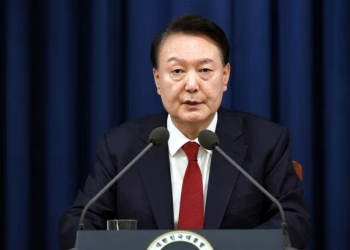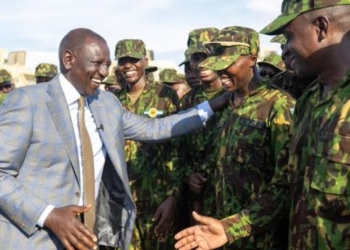“We can’t disclose why we’re here; it’s top secret!”
I hadn’t inquired about the purpose of the inebriated British man in odd military attire at the Ukrainian café, but he was eager to share anyway.
It was summer 2022, and Kyiv’s Khreshchatyk Street was dotted with similar individuals claiming to join Ukraine’s fight against Russia.
“War attracts all sorts,” I mused.
We now know that among them was Ryan Routh, a suspect in an alleged assassination attempt on Donald Trump in the U.S. this past Sunday.
Routh was described as an “omnipresent figure” in Kyiv, according to Chris Lutz, an aid worker who encountered him multiple times.
“I wouldn’t label him as crazy,” Lutz stated. “He genuinely wanted to assist Ukraine, but it was becoming unhealthy.”
Ukrainian officials have distanced themselves from Routh, who allegedly tried to recruit foreign soldiers for the Ukrainian military but was unsuccessful.
“He has never served in Ukraine’s International Legion and has no connection to the unit,” said a spokesperson for the legion.
Reportedly, he frequently reached out to the legion with ideas deemed “nonsensical” and “delusional” by a Ukrainian soldier.
Routh also acknowledged being rejected, citing his age and lack of combat experience.
In response to the events in the U.S., Ukrainian President Volodymyr Zelensky expressed relief that Trump was unharmed, with no mention of the suspect, who had been a fervent supporter of Ukraine.
A Ukrainian Dilemma
Just three days after Russia’s full-scale invasion, Zelensky called for “friends of peace and democracy” to join the fight, and thousands responded.
Thus, Ukraine’s International Legion was formed, initially thought to have 20,000 potential volunteers; experts now estimate over 4,000 foreign fighters in Ukraine.
Despite Routh’s failures to contribute to that number, his arrest in Florida poses a headache for Kyiv.
Lt. Andriy Kovalenko of Ukraine’s National Security and Defence Council warned that Russia would exploit the assassination attempt for propaganda.
“Playing with fire has its consequences,” said Kremlin spokesman Dmitry Peskov when questioned about possible Ukrainian involvement.
On Russian state TV, host Olga Skabeyeva characterized Routh as a “crazed fan of Zelensky,” adding, “Another attempt on Donald’s life is officially linked to Ukraine.”
A pro-Russian Telegram channel in Ukraine claimed the intelligence service was behind the assassination attempt, alleging that Routh had traveled to Ukraine to “recruit American mercenaries,” though no evidence supported these claims.
“Of course, all this is a lie,” Lt. Kovalenko stated. “But information warfare is a key aspect of the conflict.”
Sandra Andersen Eira, a Norwegian fighter with the Ukrainian Marine Corps, expressed confusion: “How did he get rejected by the International Foreign Legion?”
She noted that until last May, there was minimal vetting; a minimum six-month contract and basic training have since been instituted, but recruits still aren’t required to have military experience, which some consider beneficial. “Routh was just another one of those types,” she said.
“Some volunteers have good intentions but may not be mentally or physically fit. Others are just delusional.”
This might apply to Ryan Routh.
While he didn’t aid Ukraine, his presence there has created an unwelcome link to an assassination attempt on a U.S. presidential candidate.















